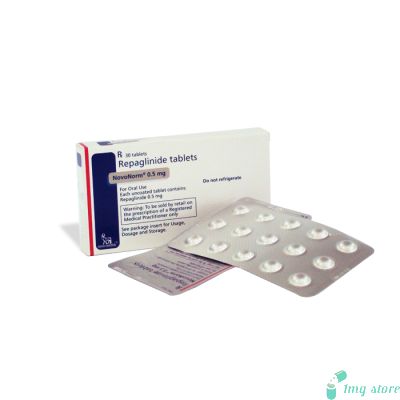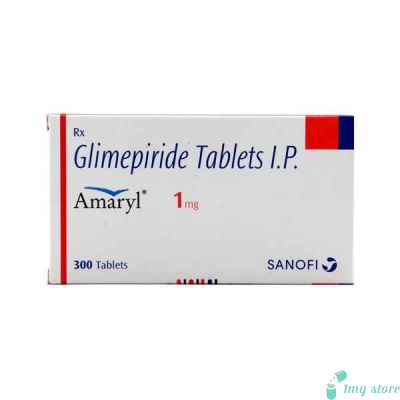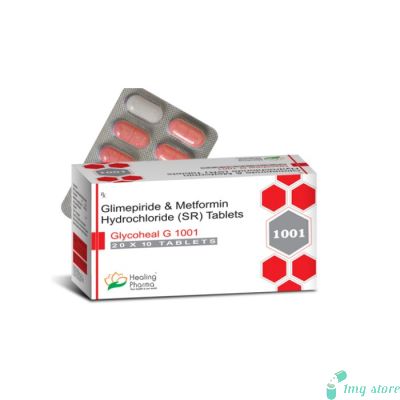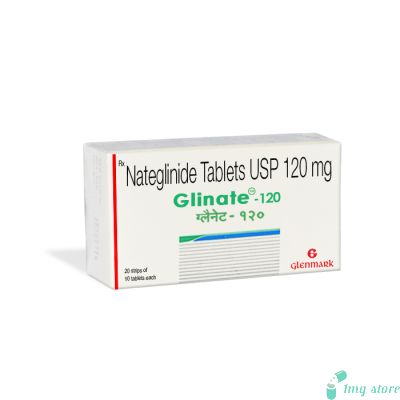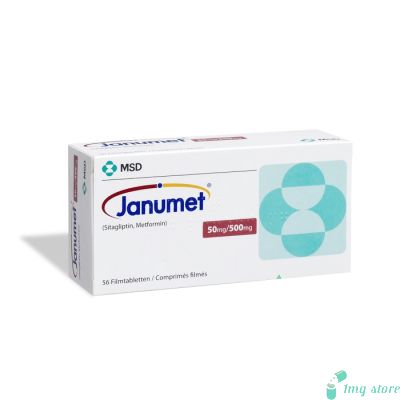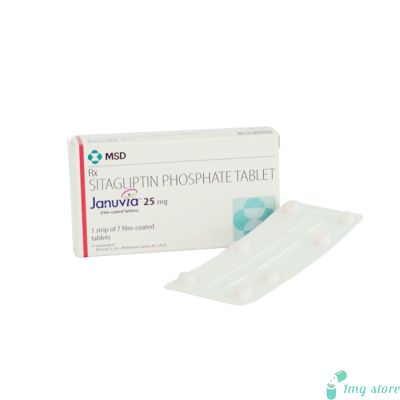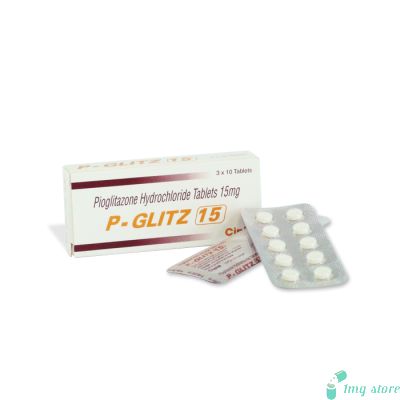Glypride Tablet (Glimepiride)
Buy Glimepiride Tablets, also known by their brand names Glypride and Amaryl, are a widely prescribed oral medication for managing type 2 diabetes. These tablets contain Glimepiride as the active ingredient, which helps lower blood sugar levels by stimulating insulin secretion from the pancreas.
Glimepiride Tablets: Managing Diabetes Effectively
Diabetes mellitus, a chronic metabolic disorder characterized by high blood sugar levels, poses a significant global health challenge. The advent of medical advancements has led to the development of various pharmaceutical interventions to tackle this condition. Among these, Glimepiride stands out as a widely used oral antidiabetic medication. Marketed under the brand names Glypride and Amaryl, Glimepiride is renowned for its efficacy in blood sugar management. This article delves into the essential aspects of Glimepiride tablets, encompassing dosage information, uses, potential side effects, precautions, and drug interactions.
Glimepiride Manufacturer: Sun Pharma, India
Glimepiride Dosage Information:
Recommended Dosage: Glimepiride tablets are available in various strengths, typically ranging from 1 mg to 4 mg. The initial dosage is determined by the treating physician based on factors such as the patient's current blood sugar levels, response to previous antidiabetic medications, and overall health status. Generally, the initial dose is 1-2 mg taken orally once a day, preferably with breakfast or the first main meal.
Glimepiride 2mg Tablet: Glimepiride is available in a 2mg tablet strength. This dosage should be taken as per your healthcare provider's prescription to effectively manage your blood sugar levels.
Missed Dose: In the event of a missed dose, it's advised to take the missed dose as soon as the patient remembers, unless it's close to the time for the next scheduled dose. In such cases, patients should avoid taking extra medication to make up for the missed dose, as it can lead to an increased risk of hypoglycemia (low blood sugar).
Overdose: Overdosing on Glimepiride can be dangerous and may result in severe hypoglycemia. Symptoms of hypoglycemia include dizziness, confusion, rapid heartbeat, shakiness, and in extreme cases, unconsciousness. If an overdose is suspected, medical attention must be sought immediately. It's essential to have a source of glucose, such as candy or glucose gel, readily available for such situations.
Glimepiride Tablet Prescription: To acquire Glimepiride Tablets, a prescription from a qualified medical professional is generally required. This ensures the medication is used safely and appropriately in accordance with your individual health needs.
Buy Glimepiride Tablet: You can conveniently purchase Glimepiride Tablets on 1mgstore.com, ensuring easy access to your medication from the comfort of your home.
At 1mgstore.com, you can find a range of alternatives to Glimepiride, catering to various needs for managing diabetes. These alternatives encompass a selection of medications that are prescribed to help control blood sugar levels effectively. From metformin, which enhances insulin sensitivity, to sitagliptin, which boosts incretin hormones, the platform offers a diverse array of options. Additionally, you can explore alternatives like Pioglitazone, Acarbose, and empagliflozin, each employing distinct mechanisms to aid in diabetes management. The availability of these alternatives ensures that individuals can make informed choices in consultation with their healthcare professionals, tailoring their treatment plans to their unique requirements and preferences.
Essential Safety Advice to Follow When Using Glypride Tablet (Glimepiride)
- Hypersensitivity: Individuals with a known hypersensitivity to sulfonylureas, including Glimepiride, should avoid its use, as it could lead to severe allergic reactions.
- Liver or Kidney Impairment: Glimepiride is primarily metabolized by the liver and excreted by the kidneys. Patients with impaired liver or kidney function may require dose adjustments or alternative treatment options.
- Pregnancy and Breastfeeding: The safety of Glimepiride/Amaryl during pregnancy and breastfeeding has not been firmly established. Pregnant or breastfeeding individuals should consult their healthcare provider for suitable alternatives.
- Hemolytic Anemia: Glimepiride may exacerbate or provoke hemolytic anemia in patients with glucose-6-phosphate dehydrogenase (G6PD) deficiency. Such patients should avoid Glimepiride.
- Surgery and Medical Procedures: Patients scheduled for surgery or medical procedures may need to discontinue Glimepiride temporarily, as fasting or alterations in food intake can affect blood sugar levels.
Some of the specific indications for Glypride Tablet (Glimepiride) include
- Diabetes Management: Glimepiride belongs to the sulfonylurea class of antidiabetic drugs. It enhances insulin secretion from the pancreas, thereby helping to lower blood sugar levels. It is primarily prescribed for patients with type 2 diabetes who cannot adequately control their blood sugar through diet and exercise alone.
- Monotherapy or Combination Therapy: Glimepiride can be used as monotherapy or in combination with other antidiabetic medications, including metformin or insulin, to achieve optimal blood sugar control. However, its usage in combination with other medications should be closely monitored by a healthcare professional.
Side Effects:
Hypoglycemia: The most common side effect of Glimepiride is hypoglycemia, especially when taken inappropriately or when meal timings are irregular. It's crucial for patients to be aware of the symptoms of hypoglycemia and to have a plan in place to manage it.
Gastrointestinal Distress: Some patients may experience gastrointestinal symptoms such as nausea, vomiting, or stomach discomfort. These side effects are generally mild and temporary.
Allergic Reactions: Although rare, allergic reactions to Glimepiride can occur. Signs of an allergic reaction include rash, itching, swelling, severe dizziness, and trouble breathing. Medical attention is necessary if any of these symptoms manifest.
Weight Gain: Weight gain is a potential side effect associated with Glimepiride use. Patients should monitor their weight and discuss any significant changes with their healthcare provider.
Skin Reactions: Glimepiride use has been linked to skin reactions in some cases, including photosensitivity and skin rashes. Patients should avoid excessive sun exposure and wear protective clothing when outdoors.
Answers to Common Inquiries about Glimepiride Tablets
Can Glimepiride be used in type 1 diabetes?
No, Glimepiride is specifically indicated for type 2 diabetes. It enhances insulin secretion from the pancreas, which might not be effective in type 1 diabetes where insulin production is severely compromised.
Does Glimepiride cause long-term weight gain?
Yes, Glimepiride can lead to weight gain as a side effect. It's essential to monitor your weight and maintain a healthy lifestyle while using the medication.
Can Glimepiride be taken with herbal supplements?
It's best to consult your healthcare provider before combining Glimepiride with herbal supplements, as some may interact with the medication and affect blood sugar levels.
Is Glimepiride safe for elderly patients?
Glimepiride can be used in elderly patients, but caution is necessary due to the increased risk of hypoglycemia and potential interactions with other medications they might be taking.
Does Glimepiride replace the need for a healthy diet and exercise?
No, Glimepiride is meant to complement a healthy diet and regular exercise. Lifestyle modifications remain crucial for effective diabetes management alongside medication use.
Significant Drug Interactions that Require Attention For Glypride Tablet (Glimepiride)
- Alcohol: Combining Glimepiride with alcohol can potentiate the risk of hypoglycemia. It's advisable to limit alcohol consumption and discuss its use with a healthcare provider.
- Beta-Blockers: Certain beta-blockers used to treat hypertension can mask the symptoms of hypoglycemia, making it challenging to recognize low blood sugar levels. Regular blood sugar monitoring becomes crucial when these medications are used concomitantly.
- NSAIDs: Nonsteroidal anti-inflammatory drugs (NSAIDs) can potentially increase the hypoglycemic effects of Glimepiride and raise the risk of hypoglycemia.
- Sulfonamide Antibiotics: Some sulfonamide antibiotics may interact with Glimepiride, potentially intensifying its hypoglycemic effects. Close monitoring of blood sugar levels is essential in such cases.
- Thiazide Diuretics: Thiazide diuretics, often used to manage hypertension, can influence blood sugar levels. The combination of Glimepiride with thiazide diuretics requires vigilant monitoring.
| Manufacturer | : | Sun Pharma, India |
| Equivalent Brand | : | Amaryl |
| Generic Search | : | Glimepiride |







